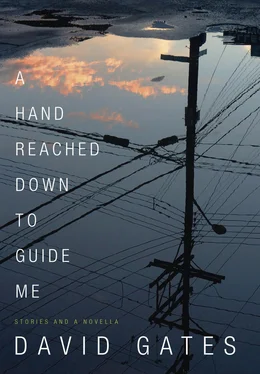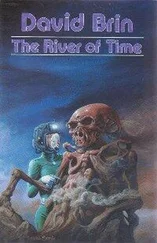David Gates - A Hand Reached Down to Guide Me
Здесь есть возможность читать онлайн «David Gates - A Hand Reached Down to Guide Me» весь текст электронной книги совершенно бесплатно (целиком полную версию без сокращений). В некоторых случаях можно слушать аудио, скачать через торрент в формате fb2 и присутствует краткое содержание. Жанр: Современная проза, на английском языке. Описание произведения, (предисловие) а так же отзывы посетителей доступны на портале библиотеки ЛибКат.
- Название:A Hand Reached Down to Guide Me
- Автор:
- Жанр:
- Год:неизвестен
- ISBN:нет данных
- Рейтинг книги:5 / 5. Голосов: 1
-
Избранное:Добавить в избранное
- Отзывы:
-
Ваша оценка:
- 100
- 1
- 2
- 3
- 4
- 5
A Hand Reached Down to Guide Me: краткое содержание, описание и аннотация
Предлагаем к чтению аннотацию, описание, краткое содержание или предисловие (зависит от того, что написал сам автор книги «A Hand Reached Down to Guide Me»). Если вы не нашли необходимую информацию о книге — напишите в комментариях, мы постараемся отыскать её.
magazine anointed “a true heir to both Raymond Carver and John Cheever.”
A Hand Reached Down to Guide Me Relentlessly inventive, alternately hilarious and tragic, always moving, this book proves yet again that Gates is one of our most talented, witty and emotionally intelligent writers.
A Hand Reached Down to Guide Me — читать онлайн бесплатно полную книгу (весь текст) целиком
Ниже представлен текст книги, разбитый по страницам. Система сохранения места последней прочитанной страницы, позволяет с удобством читать онлайн бесплатно книгу «A Hand Reached Down to Guide Me», без необходимости каждый раз заново искать на чём Вы остановились. Поставьте закладку, и сможете в любой момент перейти на страницу, на которой закончили чтение.
Интервал:
Закладка:
I sipped for a while, thinking the thing through, ate some cereal to have something in my stomach because it wouldn’t do to vomit, then drank more while I went around opening windows, except the ones at the front of the house that somebody might see from the road. I brought the bottle upstairs—I could feel it was starting to get the job done—and ran a hot bath. I had a claw-foot tub like the Holtzmans’, but somebody (I bet Mrs. Johnson again) had dolled up the outside with pink house paint. I counted out six Advil PMs. Any more and I might puke up everything and be back to square one. I stripped down to my boxers and got in the tub. It seemed wrong to get them wet, but I didn’t want anybody to have to see the whole deal and then not be able to get it out of their head. I had the bottle right there next to me. Eventually the water would get cooler—I thought I could already feel it—and then cold, but I’d be asleep by then. I got a ridiculous image of a man in a block of ice shaped like a bathtub, which told me I was going down. When the pipes and toilets froze up and burst, somebody would end up with a good-paying job: whatever rich person got the house would want everything brought back to 1803 and they’d have themselves a showplace. I could just see it.
—
Of course it was the dumb-ass move of all time. I don’t think the water was even fully cold when Jesse hauled me out, though I can’t remember much about those minutes. Amber had called him to stop by and check on me when he got off work. He got hold of Junior Copley, who was just sitting down to supper, and Junior came around with the EMS van and they got me down to Greenfield for an overnight in the hospital. The doctor wanted me to go into counseling; I was back hanging drywall Friday afternoon. Junior and Jesse both said they’d keep it quiet, but things like that get around in a town this size. Then after a while, they just fade into the background of what people know about you.
Johnny ended up coming back to work for me. He’d driven all the way down to Daytona Beach and Arlene was pissed as hell, but he says they’re getting along better now. So I’ve got my big three together again. Myron’s talking about retiring, but Jesse, they’ll have to carry him out feet-first. I figured out I’m worth a million dollars; that’s on paper, though, and a million’s not as much as it used to be. Amber didn’t go to California; she moved to South Carolina, bought a little condo and got into veterinary school. I don’t think that’s right for her; she should be working with people. I’ll hear from her a couple times a year. She’ll send me pictures of pit bulls she’s rescued, but never one of herself. She’s got a website called forpittiessake.com, which she thought up herself. She’s going to get married someday, I know that about her.
You always like to say that if you were young and starting out again you’d do this or you’d do that, but I don’t think anybody seriously means it and it’s not going to happen anyway. I took myself out of the world early on, and looking back now I don’t think I ever got close to anybody, and of course you get judged for that. Apparently there isn’t any “ we ”—like I had something lacking. But what everybody needs to understand, you get to a point where you can’t do anything about who you are anymore. And the same applies to other people, so that’s who you’re dealing with. And then the best you can hope for is not to do anybody damage, and good luck with that. I don’t know, maybe I’m just talking to myself here: Who made me the big authority on what everybody needs to understand? It could be that I never got the memo, and that it’s all about love, so-called, but am I the only one? You’d hate to think so.
Monsalvat

Back during the summer, a mockingbird had perched in the ginkgo tree in front of their building and kept at it all night. Paige would lie there while Richard slept, trying to count how many different songs it knew, but by the third or fourth she’d forget the first: it had been her summer of having just a hit or two of dope before bed, sticking her head out the bathroom window before she lit the pipe. Richard said the songs weren’t music, strictly speaking, but sounds meant to warn predators away from the young, and he did know music if nothing else; in that, her father was wrong about him.
Now, in October, the mockingbird was a long-gone daddy and ginkgo nuts lay all over the sidewalk, looking like evil white grapes, smelling like vomit. She and Richard were both back teaching, and she’d added a little bump of speed in the morning to her drug regimen: just a bump—one—in each nostril while running water in the bathroom sink. On Tuesday and Thursday mornings, higher than a motherfucker, she’d come out of the building with that god-awful salty taste still in her throat and step around the ginkgo nuts so the Ten O’Clock Scholars wouldn’t think they were smelling vomit on her shoes. The other mornings, after she and Richard moved the cars, she could actually work again on her book, without which she would always be an adjunct and whose title she had now changed to Merrill, Mirabell and the Mystical Moment , though sooner or later she’d have to admit to herself that the alliteration was tacky. She hid her really very modest stash in her plastic makeup bag, along with the silver salt spoon, once her grandmother’s, its tiny bowl fluted like a scallop shell, the lighter and the wooden hippie pipe that was the least depressing one she could find in the head shop on Eighth Street. She kept the makeup bag in her underwear drawer on top of her diaphragm.
Paige just happened to know that she and Richard last had sex on May 24, the day after her fortieth birthday. He’d taken her to Café Loup, and he drank so much that when they got into bed and she reached into his boxers he asked for a rain check. He honored it the next morning, or, rather, she did. Then she found out about Mary Beth. He swore never again, and the never again turned out to extend to Paige as well. Nowadays Richard would wake up first, stretch and stretch, then hop out of bed: get down there, soldier, and give me twenty. He kept himself in such nice shape that she hated to watch. But. Then he’d go out to the kitchen to make their coffee while she woke up by reading a poem or two in her father’s first book, which she didn’t want to admit was his best; she’d begun keeping it on the night table. And sometimes she put her hand in her pants and did the supposedly necessary.
On a Thursday in the middle of October, he brought in coffee and said, “I need to tell you something.”
“What can this be?” she said.
“Nothing you don’t know,” he said. “It’s just—this is all really confusing to me. And I thought I might just go take some time to think.”
“If what?”
“I don’t follow you.”
“You said you thought you might,” she said. “You might if what?”
“Okay,” he said. “This is an excellent example of why.”
She closed her eyes, shook her head. “I’ve been awake for like two minutes ,” she said.
“Sorry,” he said. “I guess I shouldn’t have jumped you first thing.” Jumped you? He must already have been wishing he’d rephrased that.
“Actually, I don’t think I really want to talk,” she said. “Why don’t you just go.”
—
But you know? It turned out to be a good morning. Because she was totally jazzed to teach. For her Ten O’Clock Scholars she detangled “Aire and Angels,” “The Sunne Rising,” “The Good-Morrow” and “The Extasie.” (She’d xeroxed from an edition in the original spelling, so as not to soften the alienness.) Then she cabbed it down to the World Café to meet Sally. You could count on Sally to be late, so she nursed a cup of coffee while prepping for her two o’clock class, Dante for Dummies. (Only Richard knew these nicknames. It was unfair that he should still know them.)
Читать дальшеИнтервал:
Закладка:
Похожие книги на «A Hand Reached Down to Guide Me»
Представляем Вашему вниманию похожие книги на «A Hand Reached Down to Guide Me» списком для выбора. Мы отобрали схожую по названию и смыслу литературу в надежде предоставить читателям больше вариантов отыскать новые, интересные, ещё непрочитанные произведения.
Обсуждение, отзывы о книге «A Hand Reached Down to Guide Me» и просто собственные мнения читателей. Оставьте ваши комментарии, напишите, что Вы думаете о произведении, его смысле или главных героях. Укажите что конкретно понравилось, а что нет, и почему Вы так считаете.











